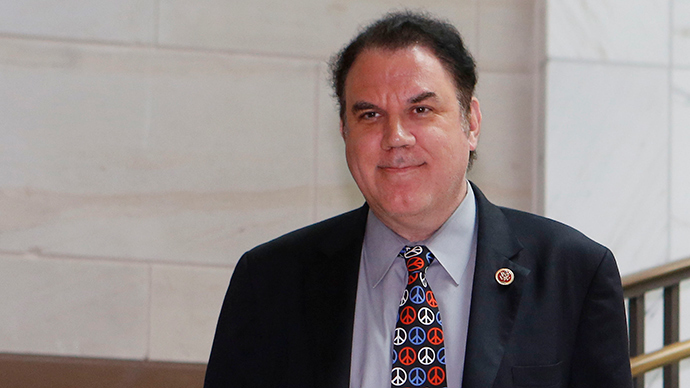Florida congressman barred from seeing classified sections of 9/11 inquiry - report

A request by US Rep. Alan Grayson to access a portion of a 2002 congressional report on the September 11, 2001 attacks was denied by the House Intelligence Committee based on political reasons, the Florida Democrat said.
Grayson’s request pertains to 28 pages of Congress’ Joint Inquiry that were ordered to be redacted by then-President George W. Bush. The congressman said his search stemmed from proposed legislation in the House that seeks to release the classified section to the public.
The censored section of the Joint Inquiry provides information on “specific sources of foreign support” for the 9/11 attackers while they were in the United States. “The role of Saudi Arabia in funding 9/11” is part of these classified materials, according to former US Sen. Bob Graham, a fellow Florida Democrat, who co-chaired the Joint Inquiry.
Grayson, of Orlando, told BrowardBulldog.org that the House Intelligence Committee’s vote to block his access of the classified sections amounted to a political attack based in part on the congressman’s support for Edward Snowden, the former intelligence contractor who in 2013 leaked a massive trove of documents detailing the National Security Agency’s global spying regime.
“Why was I denied? I have been instrumental in publicizing the Snowden revelations regarding pervasive domestic spying by the government and this is a petty means for the spying industrial complex to lash back,” Grayson said last week, according to BrowardBulldog.org.
Grayson said outgoing House Intelligence Committee Chairman Mike Rogers (R-Michigan) orchestrated the denied request. The Committee voted along party lines, 8 to 4, on Dec. 1 to block Grayson’s access. The Committee went onto to overwhelmingly approve requests for access to other classified material from 11 other House members.
“Congressman Rogers made serious misrepresentations to other committee members when he brought this up,” Grayson told BrowardBulldog.org. “When the Guardian reported on the fact that there was universal domestic surveillance regarding every single phone call, including this one, I went to the floor of the House and gave a lengthy speech decrying it.”
Grayson said Rogers, a Republican, distorted the Democrat’s denunciation of the NSA.
“Chairman Rogers told the committee that I had discussed classified information on the floor. He left out the most important part that I was discussing what was reported in the newspaper,” said Grayson. “He clearly misled the committee for an improper purpose: to deny a sitting member of Congress important classified information necessary for me to do my job.”
Rep. Walter Jones (R-North Carolina), has sponsored House Resolution 428, which calls on President Barack Obama to publicly release the censored 28 pages of the Joint Inquiry report, as those pages are “necessary for a full public understanding of the events and circumstances” of 9/11, Jones said.
Former Sen. Graham, the report’s co-author, has called for declassification of the pages, as have 9/11 Commission Chairman Thomas Kean and Vice Chairman Lee Hamilton.
“I’m embarrassed that they’re not declassified,” said Hamilton, a former congressman, according to BrowardBulldog. “We emphasized transparency. I assumed incorrectly that our records would be public, all of them, everything.”
Grayson, a member of the House Foreign Affairs Committee, is known for being one of the most outspoken liberals on Capitol Hill. He has been especially dogged over matters of militarism, surveillance and Wall Street improprieties.
His support for Snowden extended to the top reporter, Glenn Greenwald, instrumental in helping the former contractor divulge the NSA’s secrets. After the leaks, Grayson wrote to US Attorney General Eric Holder seeking assurance that Greenwald would not risk facing detainment or arrest if he returned to the US from his home in Brazil.
Earlier this year, former NSA chief Keith Alexander left the surveillance agency and took his valuable knowledge of America’s deepest spycraft secrets to the welcoming arms of the private sector. Grayson was a top critic of Alexander’s new private sector company, IronNet Cybersecurity, after the firm hired a current NSA executive to work concurrently with that group and the government. Alexander’s monthly consulting fee, upwards of $1 million per client, also raised eyebrows.
“I question how Mr. Alexander can provide any of the services he is offering unless he discloses or misuses classified information, including extremely sensitive sources and methods,” Grayson wrote earlier this year to the Security Industries and Financial Markets Association when it was revealed that they had retained the former spy chief. “Without the classified information that he acquired in his former position, he literally would have nothing to offer to you.”
Last year, Grayson invited Pakistani victims of US drone strikes to speak in front of members of Congress to urge an end to the mechanized, extrajudicial killings.












